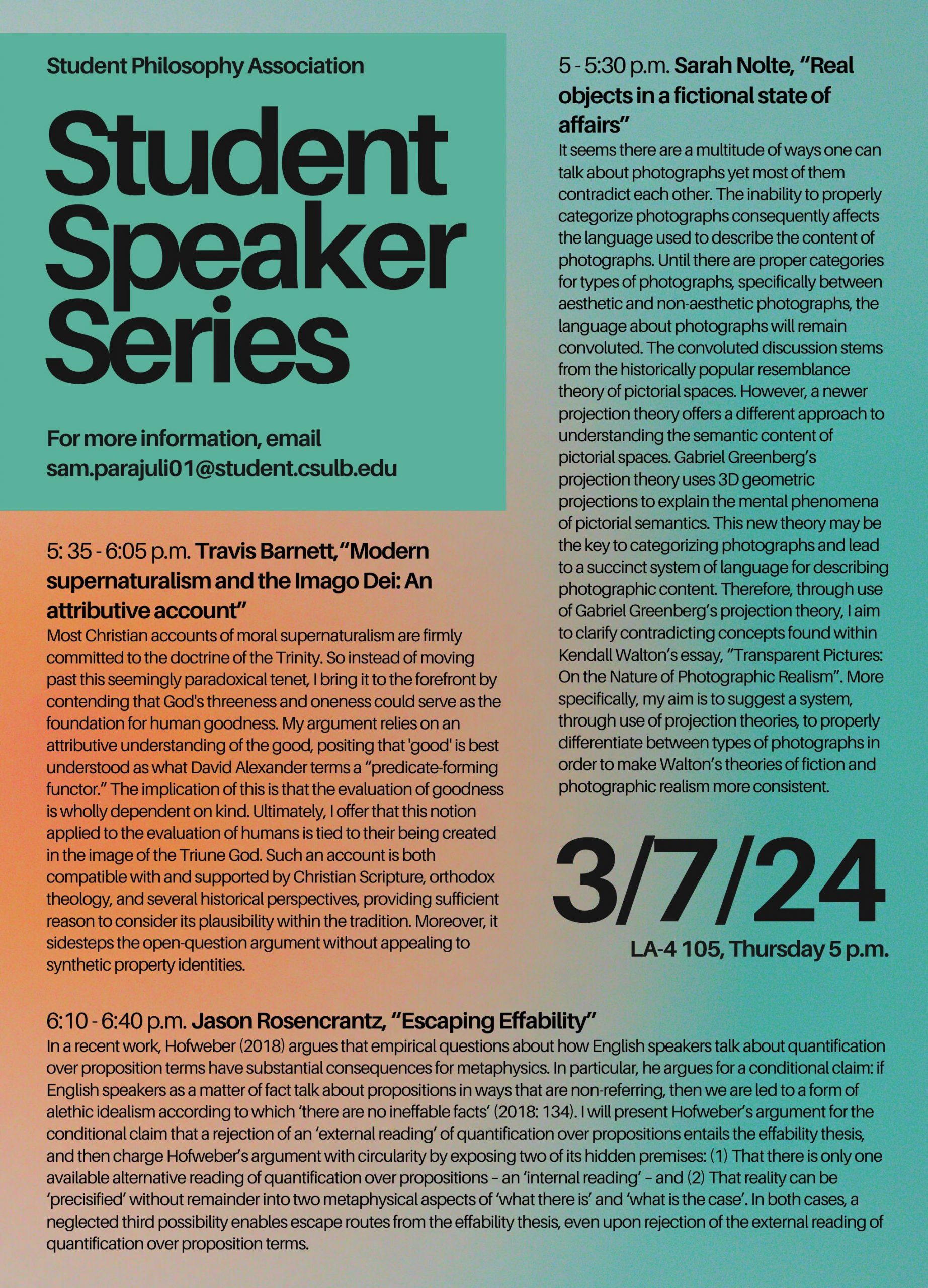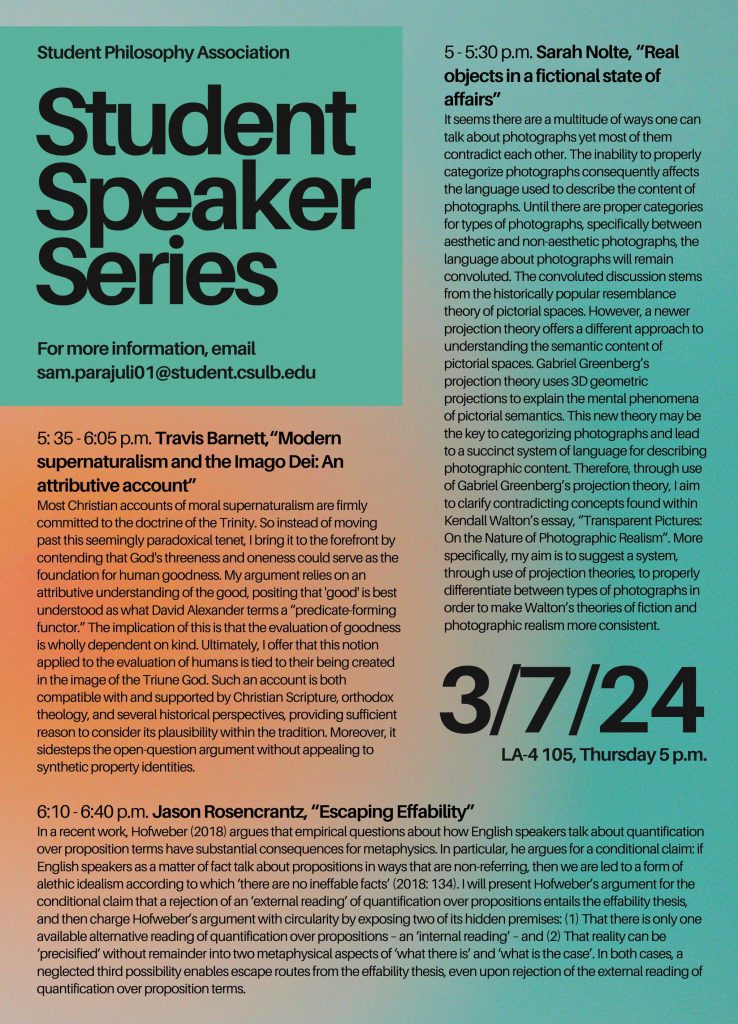
- This event has passed.
SPA Student Speaker Series: Sarah Nolte, Jason Rosencrantz, Travis Barnett
March 7 @ 5:00 pm - 7:00 pm
This SP24, the Student Philosophy Association is hosting the next iteration of its Student Speaker Series. Come join up for snacks and refreshments and student talks. Questions can be directed to SPA President Sam Parajuli <sam.parajuli01@student.csulb.edu>.
The event will take place in LA4–105 at 5:00pm–7:00pm on Thursday March 7th.
Program:
5:00pm–5:30pm: Graduate Student Research Presentation + Q&A
Jason Rosencrantz (Cal State Long Beach)
‘Escaping effability’
‘Escaping effability’
- Abstract: In a recent work, Hofweber (2018) argues that some empirical questions about how English speakers talk about quantification over proposition terms have substantial consequences for metaphysics. In particular, he argues for a conditional claim: if, as a matter of fact, English speakers talk about propositions in ways that are non-referring, then metaphysicians are led to a form of alethic idealism according to which ‘there are no ineffable facts’ (2018: 134). This talk presents Hofweber’s argument for the conditional claim that a rejection of an ‘external reading’ of quantification over propositions entails the effability thesis, and then charges Hofweber’s argument with circularity by exposing two of its hidden premises: (1) That there is only one available alternative reading of quantification over propositions—an ‘internal reading’—and (2) that reality can be precisified without remainder into two metaphysical aspects, called ‘what there is’ and ‘what is the case’. In both cases, a neglected third possibility enables escape routes from the effability thesis, even upon rejection of the external reading of quantification over proposition terms.
- Areas: Metaphysics, Philosophical Logic, Philosophy of Language
5:30pm–6:00pm: Graduate Student Research Presentation + Q&A
Sarah Nolte (Cal State Long Beach)
‘Real objects in a fictional state of affairs‘
‘Real objects in a fictional state of affairs‘
- Abstract: It seems that there are many ways one can talk about photographs; yet most of them are miscategorized. The inability to properly categorize photographs affects the language used to describe the content of photographs. Until there are proper categories for types of photographs—specifically, between aesthetic and non-aesthetic photographs—our language about photographs will remain convoluted. The convoluted discussion stems from the historically popular resemblance theory of pictorial spaces. However, a newer projection theory offers a different approach to understanding the semantic content of pictorial spaces. Gabriel Greenberg’s projection theory uses 3D geometric projections to explain the mental phenomena of pictorial semantics. This new theory may be the key to categorizing photographs and lead to a succinct system of language for describing photographic content. Therefore, through use of Gabriel Greenberg’s projection theory, this talk shall aim to clarify contradicting concepts found within Kendall Walton’s essay entitled ‘Transparent Pictures’. My aim is to suggest a system, through use of projection theories, to properly differentiate between types of photographs in order to make Walton’s theories of fiction and photographic realism more consistent.
- Areas: Aesthetics, Metaphysics, Philosophy of Mind
6:00pm–6:30pm: Graduate Student Research Presentation + Q&A
Travis Barnett (Cal State Long Beach)
‘Moral supernaturalism and the imago dei: an attributive account‘
‘Moral supernaturalism and the imago dei: an attributive account‘
- Abstract: Most Christian accounts of moral supernaturalism are firmly committed to the doctrine of the trinity. This talk examines this seemingly paradoxical tenet and contends that God’s threeness and oneness could serve as the foundation for human goodness. My argument relies on an attributive understanding of the good, positing that ‘good’ is best understood as what David Alexander terms a ‘predicate-forming functor’. An implication is that the evaluation of goodness is wholly dependent on kind. Ultimately, I offer that this notion applied to the evaluation of humans is tied to their being created in the image of the triune God. Such an account is both compatible with and supported by Christian scripture, orthodox theology, and several historical perspectives, and thus provides sufficient reason to consider its plausibility within the tradition. Moreover, it sidesteps the open-question argument without appealing to synthetic property identities.
- Area: Theology


